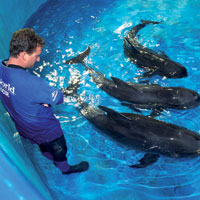 Saving stranded whales: 'Just like a patient in the emergency room'
Saving stranded whales: 'Just like a patient in the emergency room'
STORY
The plight of the pod of 22 short-finned pilot whales that came ashore at Avalon State Park Beach on Sept. 1 has brought veterinarians, volunteers, researchers and conservationists to the aid of the surviving mammals in what has become a spirited and sometimes heartbreaking rescue mission.
The four survivors were transported to SeaWorld Orlando on Sept. 5 for further treatment and rehabilitation after critical care at Florida Atlantic University’s Harbor Branch Oceanographic Institute.
“Mass strandings evoke the strongest human emotions and provoke the strongest scientific curiosity,” said Steve McCulloch, program manager for the institute’s Marine Mammal Research and Conservation Program. “They evoke and provoke. It’s a two-way street. They generate empathy and generate tremendous scientific information.”
At SeaWorld the young whales, ranging from 130 to 325 pounds, and 7 to 11 feet in length, were placed in quarantine and round-the-clock care was maintained. They are in “guarded condition,” according to SeaWorld.
At the Fort Pierce institute, McCulloch described an intense effort to stabilize the animals that unfolded over days before their transport to SeaWorld.
The effort was a mix of medical science and high emotion.
“It’s just like a patient in an ER is given individual treatment for their individual needs,” McCulloch said.
The whales were gently transitioned to a new environment, placed in a temperature-controlled pool to carefully acclimate them from ocean to pool. The goal was to have them adjust as smoothly as possible, to help them feel comfortable and safe. The pool has cameras inside and above it to enable round-the-clock observation.
Initially, three males and two females were taken to Harbor Branch’s rehabilitation center. All were juveniles. Early on and unexpectedly, one male died.
“While heroic efforts were made to save the mammal, he went suddenly with little warning,” said McCulloch. “He convulsed.”
“Everything possible was done,” he said. “The emotional impact was huge.”
Still, he added:”We recovered and focused on the living and stayed positive. If the others note our changes, it changes them.
“When an animal goes into shock and dies, you have to react accordingly, secure the carcass, and get back up there and put on a brave face so that other animals we’re responding to get the same amount of attention that’s positive, not negative.”
Thorough examinations were performed, including blood, urine and fecal samples, and ultrasounds.
Their vitals and measurements were taken. All of the data helped staff develop a clinical profile and find the best way to treat each whale. They had varying degrees of injuries from the stranding.
A vital early step was keeping them hydrated, warm and comfortable and carefully tending to their digestive systems. The staff did not know in every case whether the mammal had been feeding off mother’s milk or eating live food. Veterinarians found a high white cell count, indicating infection and inflammation.
Antibiotics were administered by injection or orally.
Nutritional needs were met by feeding some fish gruel, and in some cases, a specially designed formula, to prevent any shock to their digestive systems. And there was plenty of TLC.
“They get rubbed,” McCulloch said. “No one is yelling and screaming.”
Any subtle change in behavior is a precursor to an animal going into shock or shutting down. “It’s essential to maintain this level of commitment,” said McCulloch. “Observations are key.”
The Harbor Branch institute is the only one of its kind specializing in mass strandings, between Virginia and the Florida Keys. Dozens of whales have been successfully treated and many eventually returned to sea.
But McCulloch cautioned that “getting them back into the wild is easier said than done. Considering the ordeal, it’s as good as to be expected.”
The whales appear to be responding favorably to the treatment designed and administered by veterinarians and animal experts from Harbor Branch, SeaWorld Orlando, the Florida Fish and Wildlife Conservation Commission, the Marine Mammal Conservancy, the University of Florida and Ocean Embassy.
Hundreds of people came to help the whales when they came ashore, using wet towels and water to keep them moist and turning them over to help them breathe. Still, most died or had to be euthanized. The effort continues to determine what brought them in from the sea.
The importance of states doing this kind of work shouldn’t be underestimated, McCulloch said, urging residents to buy specialty license plates to protect whales. The money supports research, education, rescue and rehabilitation of 12 whale species that inhabit Florida waters.
“Please buy a specialty license plate. It’s tax deductible. It’s $25. It helps us help them.”








